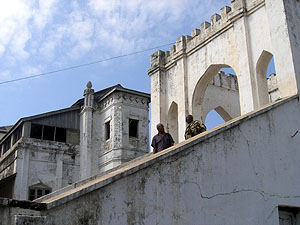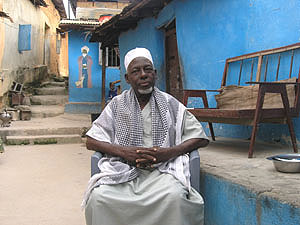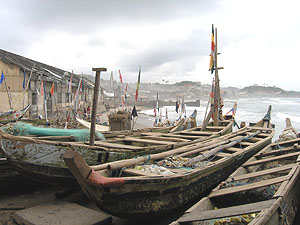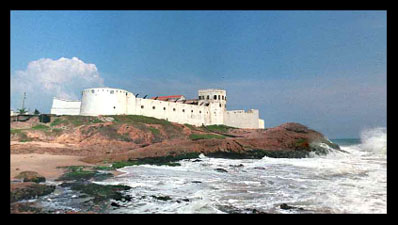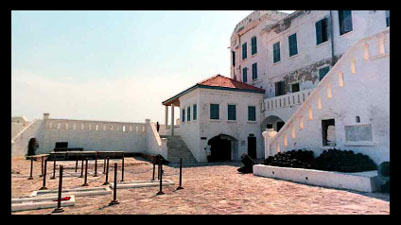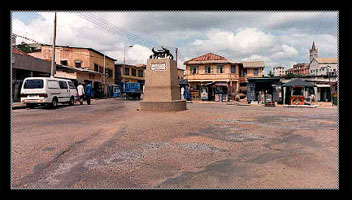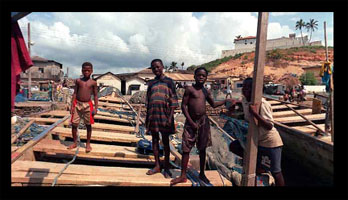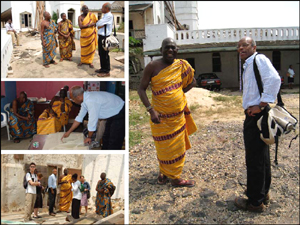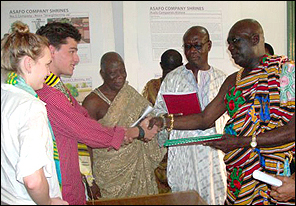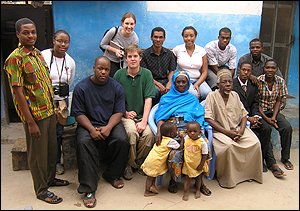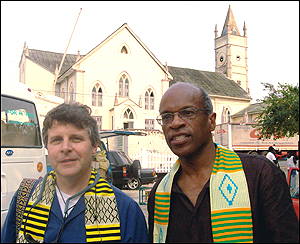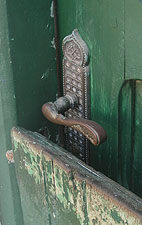|
|
|
AAS 403Z ~ Community as Classroom:
Urban Studies and Service Learning in Cape Coast, Ghana
Dec. 27, 2008 - Jan. 9, 2009
(including travel days)
Instructor: Scot French
Research Associate: Gina Haney
Application Deadline: Wednesday, Oct. 1
Full Payment Due: Saturday, Oct. 18
Questions? Contact Prof. French at sfrench@virginia.edu
or Study Abroad Advisor Mary Jo Bateman at mb2tr@virginia.edu
About
the Program | Cape Coast's Multi-Layered History
Community-Based Projects | Program Directors & Teaching
Faculty
Housing/Meals | Application
Procedure & Program Deadlines | Tuition & Fees
|
|
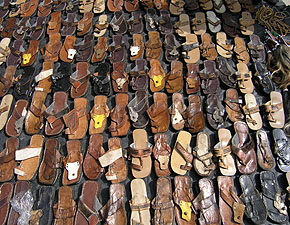
Sandals for sale outside Mosque. |
| About the Program This interdisciplinary J-Term course is designed to teach students how to “read” the presence of the past in urban cultural and physical landscapes. Students are introduced to the multi-layered history of Cape Coast, from its origin as a Fante settlement to its establishment as a European trading center on Africa’s “Gold Coast” in the seventeenth century, through the eras of slavery and abolition, colonial rule and independence. While on site, students work on various service-learning projects that assist community leaders in achieving their goals within a larger framework of conservation and economic development. For students interested in urban studies and service learning within the historical, political, and cultural context of West Africa, this course offers numerous opportunities for learning experiences outside the traditional classroom setting:
These field learning experiences will be complemented by assigned readings, lectures, and group discussions. The course will be taught in a seminar/workshop format with a majority of the time spent in the community with residents of Cape Coast. Students will be graded on class participation/community engagement (30%), field journals (30%), oral presentation of proposed service learning projects (10%), and final presentation of projects to community stakeholders and other interested parties (30%). Sponsored by The Carter G. Woodson Institute for African American and African Studies, with technical support from the Robertson Media Center's Digital Media Lab and the Virginia Center for Digital History, this cross-disciplinary J-term program targets undergraduates whose research interests focus on discerning cultural patterns and deciphering expressions of change in the built, natural, and social environments. The course and its associated service learning projects will build upon the Conservation and Tourism Development Plan for Cape Coast, developed by community stakeholders and implemented over the past nine years. For an introduction to the program, including the reflections of an AAS/Psychology double major who participated last year, follow the link to this item in the Carter G. Woodson Institute Newsletter. For historical background and a slide show on last year's program, follow the link to this U.Va. Today news article. Cape Coast's Multi-Layered History The course will unfold within the diverse historical and cultural contexts of Cape Coast, from its origins as a Fante settlement to its establishment as a European trading center on Africa's "Gold Coast" in the seventeenth century, through the eras of slavery and abolition, colonial rule and independence. The physical presence of Cape Coast Castle, one of dozens of European-built forts and castles from the slave trade era that still dot the West African coastline, looms large over the historical landscape. In The Door of No Return: The History of Cape Coast Castle and the Atlantic Slave Trade, historian William St. Clair writes that the Castle "was the headquarters in Africa of the entire British involvement in the slave trade. For 143 years (1664-1807), it was, in the words of one of its British governors, the grand emporium of the British slave trade. From this building perched on the shore of the South Atlantic Ocean, men, women, and children born in Africa were sold to British slave ships and carried to the West Indies, to North and South America, and to destinations elsewhere.... The Castle today is well preserved, partially restored, and excellently presented, with an informative museum. Along with other castles and forts in Ghana, it is designated a UNESCO World Heritage Site." But there is much more to Cape Coast than its world-famous castle. In 2000, the U.S. National Committee of the International Council on Monuments and Sites (US/ICOMOS) organized a design & planning workshop, cosponsored by Conservation International and the Ghana Heritage Conservation Trust and funded by the U.S. Agency for International Development, for conservation and tourism development for Cape Coast, Ghana. "For many years," the conferees wrote,
Community-Based Service Learning Projects All of the community-based service learning projects planned for this J-Term course draw inspiration from the Conservation & Tourism Development Plan developed by participants in the Cape Coast Design Workshop. Indeed, the digitized portions of the plan made available through the Cape Coast Archive are required reading for all participants.
Program Directors & Teaching Faculty
Housing/Meals Students will be housed in western-style hotels/guest houses with restaurant service featuring Ghanaian cuisine. Application Procedures & Program Deadlines Students must complete the UVA Study Abroad application on-line at www.studyabroad.virginia.edu. Applications are due no later than October 1, 2008, but may be submitted on-line at any time prior to that date. Further application information is available on-line. Important: Students must have a passport in hand (or application for one in process), valid through July 2009 (six months after return date), at time of application. This will ensure that there are no delays in processing applications for visas required to enter Ghana. The visa application fee is included in program cost. Students are also required to have a valid certificate of immunization for yellow fever for submission with visa application. Key Dates:
Tuition & Fees / Financial Aid
|
Still photography
and website design by Scot French. |
